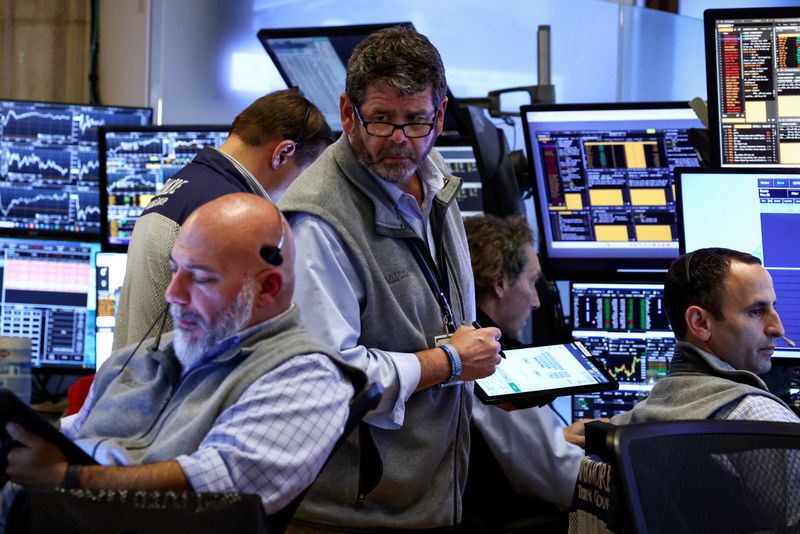By David French
(Reuters) -The rose on Wednesday and closed at a record high, and Wall Street’s two other benchmark indexes also ended higher, weathering declines in megacap tech shares thanks to small-caps gains and financial shares buoyed by strong earnings.
It was the third time in four sessions the Dow has recorded a best ever finish, ending above 43,000 points again and recouping losses from the previous session.
Also a whisker away from setting another closing milestone was the , but ultimately it finished just short, up 27.21 points, or 0.47%, to 5,842.47 points.
The rose 51.49 points, or 0.28%, to 18,367.08. The Dow Jones Industrial Average advanced 337.28 points, or 0.79%, to 43,077.70.
On a broadly positive day for Wall Street, it was financial stocks which led the way.
“I think investors have rotated a little bit out of some of the big tech companies and into the big financial companies,” said Michael Kantrowitz, chief investment strategist at Piper Sandler.
He said some movement from investors made sense as the rate environment has become more conducive for bank earnings, while a lot of optimism around artificial intelligence (AI) is priced into tech companies.
Morgan Stanley posted a record close, jumping 6.5%, after it joined peers such as JPMorgan Chase (NYSE:) in reporting strong profits following a sharp increase in investment banking revenue.
Larger regional banks, traditionally less reliant on investment banking activities, were also higher. First Horizon (NYSE:) rose 4.1% and U.S. Bancorp advanced 4.7% after reporting third-quarter results.
The broader Banks index was up 1.2%, and an index tracking regional banks gained 1.5%.
Investors also focused on small-cap stocks, with some rotation from expensive tech megacaps to less expensive sectors.
The index rose 1.6%, and the S&P Small Cap 600 gained 1.4%. Both had their highest finishes since November 2021.
While acknowledging some buying in recent days, Piper Sandler’s Kantrowitz said he was yet to be convinced of a wider rotation into small caps.
“I think people are broadening out their portfolio exposure, but still sticking with the same flavor of fundamentals,” adding people were buying high-quality small-caps but not digging into the kinds of deep-value names you would expect to attract attention if the full rotation was underway.
Among the big-tech names which dragged, Apple (NASDAQ:) dipped 0.9% after hitting a record high in the previous session. Alphabet (NASDAQ:), Meta Platforms (NASDAQ:), and Microsoft (NASDAQ:) all declined between 0.2% and 1.6%.
Chip heavyweight Nvidia (NASDAQ:), however, bucked the megacap slide, rising 3.1% after slumping nearly 5% in the previous session.
Gains in the so-called Magnificent Seven group of tech stocks have driven most of Wall Street’s record-breaking run this year. However, with valuations increasingly stretched and a brighter economic outlook, investors have been seeking opportunities elsewhere.
Four of the 11 S&P sectors registered record closing highs: financials, utilities, materials and industrials.
Utilities led sectoral gains, leaping 2%, with Dominion Energy (NYSE:)’s 5.1% increase among the catalysts after it was one of the power companies with which Amazon.com (NASDAQ:) announced agreements for developing nuclear technology to power data centers.
The second best-performing S&P sectors year to date, Piper Sandler’s Kantrowitz said he remains bullish on utilities as they benefit from both the higher power demand coming from AI, but also the lower interest rate environment.
The economically sensitive Transport index jumped 1.9%, lifted by United Airlines’ best one-day performance in six months. It gained 12.4% after it forecast better-than-expected fourth-quarter profit and announced a $1.5-billion share buyback program on Tuesday.
Delta Air Lines (NYSE:) and American Airlines (NASDAQ:) also benefited, advancing 6.8% and 7.1%, respectively.

Attention now turns to more corporate earnings are due through the week, along with key economic data including the retail sales and industrial production figures for September on Thursday.
Volume on U.S. exchanges was 10.63 billion shares, compared with the 12.13 billion average for the full session over the last 20 trading days.












